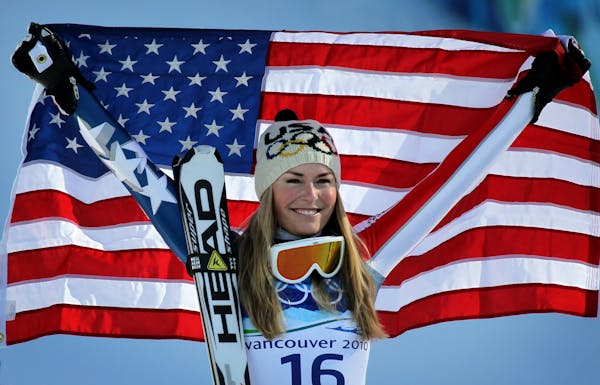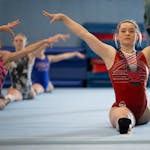BEIJING — The rules have been made clear. Anyone fortunate enough to sit in the stands at the Beijing Olympics will not be allowed to yell, or sing, or chant, or make any kind of noise that might spew coronavirus into the air.
But no one said anything about bagpipes.
"It's been a long time since I heard 'Scotland the Brave' come out," said Duluth curler Chris Plys, after a kilt-clad regiment of Chinese pipers kicked off the first night of curling Wednesday at the Olympic Games. "I was not expecting that at all."
That song might not be everyone's bag, but it lent a welcome bit of fun to the hermetically sealed bubble of the Winter Games. The four curling matches at the Ice Cube — the first events of the Olympics — featured music of all kinds, including Elvis and hip-hop. Mascot Bing Dwen Dwen, a rotund panda, showed up to entertain a few hundred hand-selected spectators.
As host of another Olympics held under tight COVID-19 restrictions, China is in the same spot as Tokyo was when it staged the Summer Games last year. Organizers are determined to make sure the show goes on, in as normal a way as possible during a global health crisis.
So volunteers at the airport, wrapped in head-to-toe protective gear, tried to lighten the mood by drawing cartoons on their white hazmat suits. Pedestrians near the Olympic Park stood on street corners and waved at buses carrying Winter Games participants.
Lee Stecklein, a former Gophers hockey player from Roseville, knows it's going to be different. At two previous Olympics, in 2014 and 2018, she could look around the rink on game day and see crazy costumes, brass bands and a sea of jerseys from different nations.
Thursday, when the U.S. played its Olympic opener against Finland, she saw a field of empty red seats.
"I'm sad the stadium won't be filled with fans,'' Stecklein said. "But that's understandable. It's still going to be a lot of fun.''
With China enforcing a zero-COVID policy, Beijing's Olympic organizers have imposed tighter restrictions than those used at the Tokyo Games. The Olympic bubble — called the "closed loop'' — has made these Olympics feel even more isolated, quite a feat in a city of 20 million people.
Those inside the loop can see Beijing only through the windows of buses and hotels. They are a community bound by daily COVID testing, with every face hidden behind a medical-grade mask.
Unlike Tokyo, where Olympic workers went home every day, all the bus drivers, chefs and volunteers who make the Beijing Games run are required to live inside the loop until the Olympics are over. Within the loop, people are separated even farther.
Every table in every dining area has tall plexiglass partitions, giving breakfast conversation all the charm of visitation day at a prison. Arriving at Beijing Capital International Airport is like entering a surgical suite; each worker is completely encased in personal protective equipment, even their phones are in plastic bags.
At the Beijing Olympic Village, organizers have added creature comforts to make up for what athletes are missing in other areas. Stecklein said the beds have remote-controlled, adjustable mattresses, and there is a daily newsletter. Though the closed loop keeps her team's circle "pretty tight,'' the village volunteers give players an opportunity to interact with the locals.
Cross-country skier Jessie Diggins of Afton has had a similar experience at the Olympic Village for snow-sports athletes in Zhangjiakou.
"All the volunteers have been so friendly, so helpful, so kind," Diggins said. "And so COVID-conscious, with the hazmat suits. It feels like they're doing a very good job keeping us safe.''
Wednesday, the Olympic flame began making its way toward Beijing in a torch relay shortened to only three days. Former NBA player Yao Ming and film director Zhang Yimou were among the torchbearers, but they didn't have much company. Like the sports venues, the torch route was closed to the public, with only a small number of invited spectators allowed to see the flame's journey in person.
The Olympic Green was largely deserted, too. In 2008, when Beijing hosted the Summer Games, it teemed with visitors from all over the world. Less than 24 hours before the Opening Ceremony, only a few people came out on a cold night to take photos in front of an illuminated Beijing 2022 logo.
The Green's venues were beautifully lit, with the Bird's Nest stadium shining in red and yellow and the Ice Cube a riot of rainbow colors. In a different part of town, Wukesong Sports Centre — a stately hockey arena next to a Bentley dealership — didn't have any bagpipes, but Thursday night's women's game between the United States and Finland featured a classic hockey organ, a DJ and Chinese dancers.
Every now and then, someone in the socially distanced crowd of a few dozen people broke the rules and yelled. The fans at the curling arena were a little more careful.
Before Wednesday's matches, a cheerleader tried to generate some noise, shouting, "Let me hear you!" Instead of shrieking, the spectators waved flags.
For Plys, that was good enough.
"The last time I played in a major competition, there were cardboard cutouts of people in the stands," he said. "We'll take fans any way we can get them right now."




